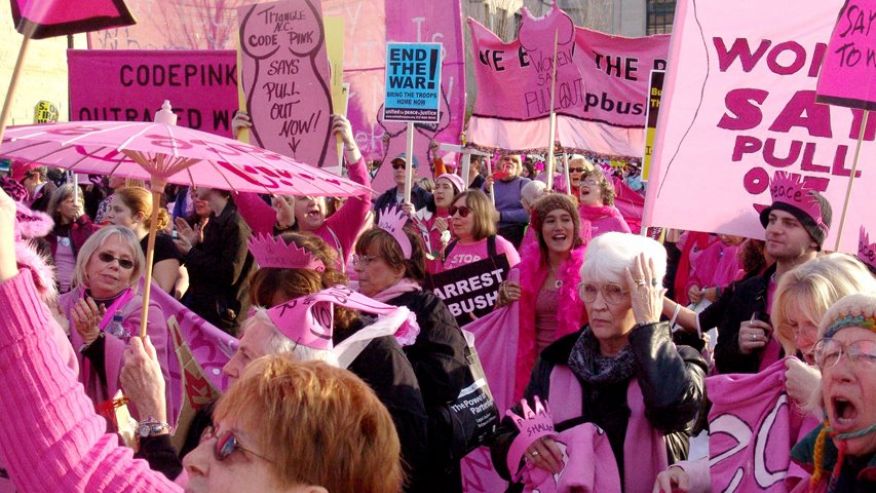
Code Hypocrisy: Why Anti-War Activists Tolerate Democratic Hawks
In the run-up to this year’s Republican National Convention, many people were expecting quite a bit of drama. The #NeverTrump crowd was likely to raise a stink about the billionaire mogul’s nomination, and some were even predicting violence. In fact, the proceedings were relatively tame, with a notable exception coming from habitual rabble-rousers, the anti-war group Code Pink.
The group has a history of disrupting Republican conventions, having infiltrated and protested every RNC since 2004, which itself is an impressive feat since the group was only founded in 2002. The group’s hostility to Republicans is not surprising: the GOP has long been regarded as the party of war.
Those who remember the George W. Bush administration will recall that hardly a day went by when Code Pink activists could not be seen on the national news, loudly denouncing the wars in Iraq and Afghanistan. But after President Bush left office, an interesting thing happened. Barack Obama, after being sworn in and receiving a Nobel Peace Prize for no discernable reason, doubled down on the Bush foreign policy, not only breaking campaign promises to end those wars, but starting several new wars as well, including his unsuccessful attempt to intervene in Syria (an effort which was widely opposed by — surprise! — Republicans.) In fact, Obama has spent more of his presidency at war than any other president in U.S. history. Pretty remarkable for a Nobel Peace Prize laureate.
You would expect Code Pink to have a problem with this, as well as with the Secretary of State who oversaw much of this war, one Hillary Clinton. The response from the anti-war group, however, has been, to put it charitably, tepid. There have been a few scattered protests, it’s true, but nothing even remotely resembling the furor was on daily display during the Bush administration.
Code Pink’s leaders, to their credit, recognize that this is a problem. “We’ve been protesting Obama’s foreign policy for years now, but we can’t get the same numbers because the people who would’ve been yelling and screaming about this stuff under Bush are quiet under Obama,” says co-founder Medea Benjamin.
Yet the reticence doesn’t appear to be unique to Obama. In an election where the Republican candidate, Donald Trump, has vocally criticized the Iraq war as a mistake and has been generally circumspect about American interventionism abroad, his Democratic opponent never met a war she didn’t like. As Secretary of State, Clinton pushed for military intervention in Iraq, Afghanistan, Libya, Syria, Yemen and Ukraine, where war has claimed a combined total in excess of a million lives. But despite all of this, a look at Code Pink’s website still shows a markedly anti-Republican bias.
A quick trawl through the organization’s press releases shows headlines about “protesting Trump” and “block[ing] access to Trump’s speech”, but members are described as “greeting” Hillary Clinton. In fact, that’s the only event specifically targeted at Clinton since the election cycle began. Meanwhile, there have been four aimed at Donald Trump, as well as protests of Airbnb and RE/MAX who, as far as I know, have relatively little to do with setting US foreign policy.
Of course, last week, the group had an opportunity to demonstrate even-handedness, with the Democratic National Convention in full swing, headlined by the most hawkish presidential nominee since John McCain. Yet while the group did raise an objection to Defense Secretary Leon Panetta, Hillary herself appears to have gotten off light. Code Pink members at the convention were overheard emphasizing that they should not “be distracted by the top of the ticket. The real work to be done is in Congress.”
This is puzzling advice considering that Congress basically doesn’t have any say in declaring wars anymore, with our most recent presidents using executive authority to drop bombs without congressional approval. Then again, when you consider that Congress is controlled by Republicans and Hillary Clinton is a Democrat, it all begins to make sense.
It’s clear that Code Pink, or at least a large number of its members, don’t really care about stopping war. They only want to stop Republican wars. This may seem like an important distinction to them, but from the perspective of the people being bombed, I imagine it makes very little difference.
Free the People publishes opinion-based articles from contributing writers. The opinions and ideas expressed do not always reflect the opinions and ideas that Free the People endorses. We believe in free speech, and in providing a platform for open dialogue. Feel free to leave a comment.



